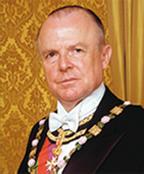Luís I of Brazil
From Daily Escape
| Luís I of Brazil | |
| | |

| |
| | |
| 5th Monarch of the Empire of Brazil | |
| | |
| Reign July 5, 1981 — September 5, 2007 | |
| | |
| Coronation | July 10, 1981 |
| | |
| Born | June 6, 1938 Palácio Imperial, Rio de Janeiro |
| | |
| Died | September 5, 2007 (age 69) |
| | |
| Predecessor | Pedro III of Brazil |
| | |
| Successor | Pedro IV of Brazil |
| | |
| Consort | Élisabeth Louise of France |
| | |
| Issue | • Pedro, Prince Imperial of Brazil (now Pedro IV of Brazil) • Prince Antônio of Orléans-Braganza • Amélia, Princess Imperial of Brazil • Princess Francisca of Orléans-Braganza • Prince João of Orléans-Braganza |
| | |
| Royal House | House of Orléans-Braganza |
| | |
| Father | Pedro III of Brazil |
| | |
| Mother | Princess Maria Elisabeth of Bavaria |
Luís I (baptized as Luís Gastão Maria José Pio de Orleans e Bragança; born June 6, 1938) was the fifth monarch of Brazil. The son of Emperor Pedro III and Princess Maria of Bavaria, he was the oldest of twelve children: His siblings were Prince Eudes Maria, Prince Bertrand Maria (the current Brazilian ambassador to the United Nations), Princess Isabel Maria, Prince Pedro de Alcântara Henrique, Prince Fernando Diniz, Prince Antônio João, Princess Eleonora Maria, Prince Francisco Maria, Prince Alberto Maria, Princess Maria Teresa, and Princess Maria Gabriela.
He ascended to the throne on July 5, 1981, upon the death of his father. He was coronated five days later, on July 10. His full title was His Imperial and Royal Highness Luís Gastão Maria José Pio de Orleans e Bragança, By the Grace of God and Unanimous Acclamation of the People, Constitutional Emperor and Perpetual Defender of Brazil. As Emperor, he served as the head of state as well titular commander of the Brazilian armed forces, but his duties were mainly ceremonial. However, he did exercise some powers of his own. (See here for details.)
Although the Emperor could not himself initiate legislation, he could request that the Imperial Parliament do so on his behalf. Several notable laws have been passed in this way, most notably the Prevention of Animal Cruelty Act of 1983, which banned bullfighting, dogfighting, and other "blood sports" involving animals.
The Emperor oversaw what he called a "forward looking," pragmatic foreign policy. He had, for example, established diplomatic relations with Kyrusia, the People's Republic of China, the German Democratic Republic, and other nations historically at odds with the Empire. In 2007, in spite of the potential risk posed to Franco-Brazilian relations, he recognized the newly independent Basque Republic (Euskadi). He did, however, maintain Brazil's close relations with the West, and he enjoyed close, friendly relations with the United States, the United Kingdom, and especially France.
In 2006, Brazilians celebrated the Emperor's Silver Jubilee. Millions of Brazilians flocked into the streets to show their pride in their country and love for their monarch. Luís was widely popular with the people: according to a March 2007 poll by Agência Brasil, 87.5% of Brazilians thought Luís was "good or very good," 9.4% "not so good," and only 3.1% "bad or very bad."
Family and personal life
Luís married Princess Élisabeth Louise of France (sister of the late Charles XI of France) on November 14, 1969 in Versailles, France. They had five children: Prince Imperial Pedro (b. 1977), now Emperor Pedro IV; Prince Antônio (b. 1979); Princess Imperial Amélia (b. 1980); Princess Francisca (b. 1981); and Prince João (b. 1985). As a result of his marriage to Élisabeth Louise, he was the uncle of France's King Charles XII, who is also his distant cousin.
The Emperor and his family are devout Roman Catholics. The Emperor never failed to attend daily Mass, even when ill or otherwise occupied. He read the entire Bible several times and knows several tracts of it by heart.
An outdoors enthusiast, he enjoyed hunting, fishing, skeet shooting, hiking, rock climbing, camping, skeet shooting, and swimming as his main hobbies. He was very robust and physically fit for his age and in excellent health. His other hobbies included reading (the Bible being his favorite book), chess (he was not a very skilled player, but enjoyed the game nonetheless), and, unusually for a man his age, video games. He owned a Nintendo Wii, which he and the King of France were said to play together often; rumor has it that the Emperor was extremely competitive when playing video games, especially against Charles. He also attended symphonies and plays fairly regularly.
Luís spoke fluent Portuguese, Spanish, English, French, and German; he could also speak a fair amount of several indigenous Brazilian languages.
Luís was a relatively close friend of the late Erik von Kuehnelt-Leddihn, who also enjoyed a close friendship with the French monarchy. Luís was a staunch social and cultural conservative, but subscribed to classical liberal/libertarian political views, and was well versed in Austrian economics.
His favorite drink was txakoli, and his favorite foods included feta, calamares, lechazo asado, chouriços, and various pastas; his favorite desserts were turrón and baklava.
Although very wealthy (his fortune is estimated to exceed $1 billion), the Emperor was a very generous philanthropist who donated tens of millions to the needy every year. Much of his wealth came from corporations and estates owned by the Royal Family.
Death
Tragically, the Emperor was assassinated on September 5, 2007, by an unknown gunman. Brazil declared a state of mourning, and millions of Brazils wore black armbands to express their sorrow. Recent polls suggest that the Emperor's posthumous approval rating climbed to as high as 97%. He was succeeded by his son, Pedro, the Prince Imperial.
